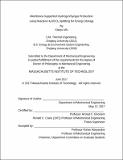Membrane-supported hydrogen/syngas production using reactive H₂O/CO₂ splitting for energy storage
Author(s)
Wu, Xiaoyu, Ph. D. Massachusetts Institute of Technology
DownloadFull printable version (7.959Mb)
Other Contributors
Massachusetts Institute of Technology. Department of Mechanical Engineering.
Advisor
Ahmed F. Ghoniem.
Terms of use
Metadata
Show full item recordAbstract
Energy storage technologies are crucial for supporting the fast expansion of intermittent renewable energy at the grid scale. One such technology is the efficient and economic conversion of H₂O and CO₂ into fuels utilizing excess thermal energy at intermediate temperatures. This thesis explores fuel production using oxygen permeable membranes. La₀.₉Ca₀.₁FeO₃-[subscript [delta]] (LCF-91) perovskite is used to develop a framework for reactor design based on a careful assessment of fuel production rates on the membrane design and operating conditions. This material exhibits strong chemical stability but relatively low permeability. Hydrogen production from water splitting is investigated using CH4 to increase the chemical potential gradient across the membrane. Analysis shows that oxygen consumption on the sweep-side is the rate limiting step, and the addition of a nickel catalyst on a porous LCF-91 layer on that side raises the hydrogen production rate from water splitting by two orders of magnitude, reaching 0.37 [mu]mol/cm²"s. Raising the oxygen flux suppresses carbon deposition and achieves optimum syngas composition for gas-to-liquid. CO₂ splitting was also demonstrated on the same membrane material, with similar enhancement as fuel is introduced and porous layers are added on both sides, but at measurably lower rates than water splitting. Based on the experimental data, an oxygen flux model incorporating the surface kinetics and ion transport is developed, in which the oxygen direct-incorporation kinetics are used on the feed-side, and the Mars-van Krevelen (MvK) mechanism for fuel (H₂, CO or CH₄) oxidation reactions are applied on the sweep-side. The data show that H₂ has the lowest activation energy for oxidation among the three fuels, and hence, leads to the highest oxygen flux for H₂O/CO₂ splitting. Moreover, while the limiting step is always the fuel oxidation in water splitting, it changes from CO formation reactions on the feed-side to fuel oxidation reactions on the sweep-side as the temperature is raised in CO₂ A monolith membrane reactor model based on the reaction kinetics is developed for hydrogen and syngas production from water splitting and partial oxidation of methane, respectively. Results show that the efficiency is ~2% points higher than the conventional steam-methane reforming, when high-purity hydrogen (>99%) is produced. Sensitivity analysis shows that, for the best performance, it is critical to maintain high operating temperatures and high catalytic reactivity for methane oxidation.
Description
Thesis: Ph. D., Massachusetts Institute of Technology, Department of Mechanical Engineering, 2017. This electronic version was submitted by the student author. The certified thesis is available in the Institute Archives and Special Collections. Cataloged from student-submitted PDF version of thesis. Includes bibliographical references (pages 231-242).
Date issued
2017Department
Massachusetts Institute of Technology. Department of Mechanical EngineeringPublisher
Massachusetts Institute of Technology
Keywords
Mechanical Engineering.